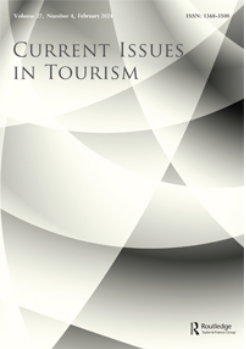评估预测游客入住率的机器学习技术:基于COVID-19大流行前后数据的实验
IF 4.6
3区 管理学
Q1 HOSPITALITY, LEISURE, SPORT & TOURISM
引用次数: 0
摘要
摘要本文分析了机器学习技术在严重需求冲击下的预测能力。具体来说,三种方法-朴素贝叶斯,随机森林和支持向量机-测试在预测马德里市的旅游住宿租赁入住率。我们比较了两种不同的情景:首先是COVID-19之前几年的预测能力,其次是大流行开始后预测需求行为的能力。结果首先表明,在没有市场干扰的情况下,随机森林模型表现出最好的预测能力。其次,COVID-19大流行造成了如此重大的变化,以至于三个被测试的模型都不完全可靠,尽管随机森林和朴素贝叶斯模型优于SVM模型。作为一种新颖的方法,本文采用占用分位数来解决现有数据和时间偏差的问题。关键词:游客占用率airbnb预测游客需求机器学习披露声明作者未报告潜在的利益冲突。本研究是在“劳动力市场和成熟行业的数字化转型与创新”研究项目的框架下进行的。“利用人工智能和平台经济(DILATO)”,由西班牙科学与创新部资助,作为2021年绿色和数字化转型项目,参考文献[批准号TED2021-129600A-I00]。本文章由计算机程序翻译,如有差异,请以英文原文为准。
Evaluating machine learning techniques for predicting tourist occupancy: an experiment with pre- and post-pandemic COVID-19 data
ABSTRACTThis paper analyses the prediction capacity of machine learning techniques under severe demand shocks. Specifically, three methods – Naive Bayes, Random Forest and Support Vector Machine – are tested in predicting rental occupancy for tourist accommodation in the city of Madrid. We compare two different scenarios: firstly, the predictive capacity in the years prior to COVID-19 and, secondly, the ability to anticipate demand behaviour once the pandemic started. The results demonstrate first that without market disturbances, the Random Forest model exhibits the best predictive capability. Second, the COVID-19 pandemic caused such major changes that none of the three tested models are entirely reliable, although the Random Forest and Naive Bayes models outperform the SVM model. As a methodological novelty, this paper includes occupancy quantiles to resolve problems with available data and temporal biases.KEYWORDS: Tourist occupancyAirbnbpredictiontourist demandmachine learning Disclosure statementNo potential conflict of interest was reported by the author(s).Additional informationFundingThis study has been carried out in the framework of the research project ‘Digital Transition and Innovation in the Labour Market and Mature Sectors. Taking Advantage of AI and Platform Economy (DILATO)’, funded by the Spanish Ministry of Science and Innovation as a 2021 Green and Digital Transition Project, with reference [grant number TED2021-129600A-I00].
求助全文
通过发布文献求助,成功后即可免费获取论文全文。
去求助
来源期刊

Current Issues in Tourism
HOSPITALITY, LEISURE, SPORT & TOURISM-
CiteScore
15.50
自引率
10.00%
发文量
230
期刊介绍:
Journal metrics are valuable for readers and authors in selecting a publication venue. However, it's crucial to understand that relying on any single metric provides only a partial perspective on a journal's quality and impact. Recognizing the limitations of each metric is essential, and they should never be considered in isolation. Instead, metrics should complement qualitative reviews, serving as a supportive tool rather than a replacement. This approach ensures a more comprehensive evaluation of a journal's overall quality and significance, as exemplified in Current Issues in Tourism.
 求助内容:
求助内容: 应助结果提醒方式:
应助结果提醒方式:


